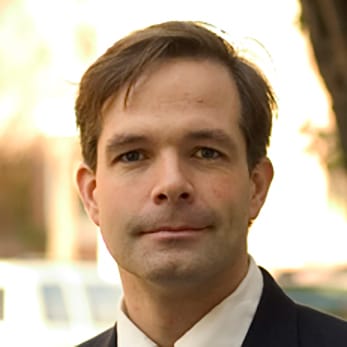How One Actor-Turned-Investor Built a Real Estate Syndication BizHow One Actor-Turned-Investor Built a Real Estate Syndication Biz
Matt Picheny has built a Sun Belt multifamily portfolio and generated healthy returns for passive real estate investors.
January 19, 2023

In growing Sun Belt markets, investors are still looking for apartment properties to add value to.
"Even though things right now in the market are a little bit volatile I'm still looking. There's still opportunity," says Matt Picheny, founder of a New York City-based real estate syndicate currently adding value to roughly 4,000 apartments located in Texas, Kansas and Missouri.
Picheny is a former actor turned syndicator.
By improving the properties, he plans to double the money his syndicate invests in each property within five to seven years—though many of his properties have achieved that goal in half the time. He achieves these yields without displacing residents and keeping rents relatively affordable.
This interview has been edited for style, length and clarity.
WMRE: Tell us a little bit about your investments.
 Matt Picheny: I work on real estate syndications. We purchase usually class-B and class-C properties in the Sun Belt. We work with both accredited investors and ‘sophisticated’ investors with whom we have a preexisting relationship.
Matt Picheny: I work on real estate syndications. We purchase usually class-B and class-C properties in the Sun Belt. We work with both accredited investors and ‘sophisticated’ investors with whom we have a preexisting relationship.
People can invest and get these really nice returns without being an institutional investor or a family office with millions and millions of dollars.
WMRE: Are all of your investors individuals? Do you work with wealth managers?
Matt Picheny: They are all individuals. They are an attorney or a doctor or you know a writer or whatever they do. They know real estate is a good investment they know there's tons of tax advantages. I would love to, if I could, hook up with a couple of wealth managers and financial advisors. The problem is [that in a syndication] they often can't be compensated.
WMRE: How much money, on average, does each investor contribute to one of Matt’s syndications?
Matt Picheny: The average investments is $78,000 as of now. That has been trending upwards. It’s been been over $100,000 in recent deals. The minimum investment is often around $50,000 and maximums can go up to $1 million.
WMRE: Do you deal with 1031 exchange investors?
Matt Picheny: With $1,000,000 or more then it may make sense for us to talk with our attorneys to get everything done but you I haven't been in that situation where someone wanted to exchange that large of a sum of money.
WMRE: How many deals do you do?
Matt Picheny: I usually do two to four deals a year. We're buying apartment complexes that were built in the 70s the 80s maybe the 90s and haven't been updated since. We fix up the property and we bring the rents up from the bottom of the market to the middle of the market.
If we can increase that income we can force appreciation even if the market is softening.
We have been underwriting for years that the market was going to soften. Because the market hasn't softened until very recently, we have been exiting our deals super early. We've been able to exit in two years instead of five or six years.
WMRE: What is resident turnover like?
Matt Picheny: We really see about a third of the property turnover in any given year. When people leave, that's when we can go in and renovate with a new appliance package and a new paint scheme.
For the residents that renew their leases, we do increase their rents but not up to not up to the market rent. They also benefit from the new amenities.
A quick story: we bought an apartment property in Lawrence, Kansas. The sidewalks had been reduced to rubble—we poured new sidewalks. We did a whole water conservation program where we took their 3.8 gallon flush toilets and replaced them with .8 gallon flush toilets. Good for our maintenance team because they don't need to go in and fix them sure, but the residents saw between that between the toilets and the shower heads—they paid their own water bill—they were thrilled their water bill was getting cut by a third. And our maintenance team actually would go and fix whatever their issues were. So had a problem with our investors! We had assumed an attrition of 30 percent. But we were still the best deal in town and people just wanted to stay. We didn't have quite the cash-on-cash returns we were expecting in year one. Now once year two came around, we started to see the normal sort of movement that you would see in apartment complex. We didn’t even get to year three because we ended up selling the property and making a very, very handsome return for investors. They were thrilled.
That's the kind of things I like to be involved in—things that are a win-win and really good for the residents of the community.
WMRE: How do you vet the properties?
Matt Picheny: We source our deals from property management and brokers and other property owners that we know in the area.
Especially if we know the operator … sometimes we can get better deals on insurance or we can protest property taxes. We leave basically no stone unturned when it comes to the expenses side. We also try to project what things we can do to increase our income. Creating a new amenity set is great, but like what if we could put in package lockers? What if we can do private backyards? What if we put a washer and dryer in the unit and we can charge you know $40 a month more? Reserved parking? Carports, you know especially in Texas where they get a lot of hail? There are all these different ways to get ancillary income. Pet rent. A Wi-Fi package.
We look to be able to double our investors’ money in five to seven years, including the cash-on-cash distributions they got while we're holding it. If it meets our criteria then we'll make an offer.
WMRE: Do you manage the apartments yourself?
Matt Picheny: We'd rather have a have another company that has tens of thousands of units. Our syndicate owns 4,000 units in a couple of different markets. If our property management manages 30,000 units, it has that clout when they're dealing with other vendors.
WMRE: Do you use leverage?
Matt Picheny: Definitely. That will go anywhere from 60 percent, this is the is the lowest amount of leverage we've done, and 80 percent is the largest amount of leverage that we've done on a deal. Now most deals are like 60 to 65 percent and maybe we're getting you know Fannie Mae or Freddie Mac financing… if you can meet affordability requirements you can get a better interest rate—you don't have to take vouchers or anything like that—the property is just naturally affordable.
WMRE: How many apartments are in in each property?
Matt Picheny: The smallest in our portfolio right now is 184 units and the largest single property we have is 468—that's part of a portfolio that we have that we packaged together with 1330 units all together.
WMRE: How much do you pay to acquire them?
Matt Picheny: The first apartment building that I bought—the one in Lawrence, Kansas—was a purchase price of almost $10 million. The largest deal I've ever done was a purchase price of $117 million. Usually we're doing stuff in the $30 to $50 million range.
Cap rates can vary. We've been purchasing properties anywhere from a four to six cap. Something that we bought that was a four cap last year might be a five cap this year.
I've been underwriting for a softening in the market. One particular example that we bought a four cap, we projected we were going to sell it at 6 1/2 cap, because that's historically what it was. We end up selling it two years later and essentially doubled our investors’ money in a little over two years which was phenomenal. We were planning on holding it for five years.
WMRE: If you had to start again today, would you be buying in Kansas and Texas or would you be looking somewhere else?
Matt Picheny: Let's take the pandemic out of the equation. Look at what's been going on in those markets it was phenomenal. People go where the jobs are and tons of jobs are moving out of California, moving out of New York and moving to the Sun Belt.
For this caliber of employee, employers have to pay them $300,000 because you know they have to pay $3 million for their home. That same caliber of employee in Texas they're getting a home that's ten times the size for a half a million bucks so I can pay them $150,000 a year.
WMRE: Do any of your investors ask you to report on the environmental, social and governance aspects of your investments?
Matt Picheny: I don't have a lot of investors asking me questions about that because I think we're very upfront ahead of time about what we're doing and how we're doing these things. Those things were values for us, even maybe before they became popular.
WMRE: Real estate isn’t your only successful investment—you mentioned Broadway?
Matt Picheny: I moved to New York in 1992 to pursue a career in theater. Went to the American Musical Dramatic Academy. Three days after graduation I was actually off on tour doing a bus and truck tour. For five years so I was in 15 professional productions.
WMRE: And now your wife, Erica, works in theatre on the business side?
Matt Picheny: Sometimes we'll get involved in shows as a producer and raise money for deals for Broadway shows. The really crazy thing is that Broadway shows are syndications just like real estate. We invested in one show and lost money. We invested in this charming, little show downtown at the Public Theatre that we absolutely loved... Hamilton. We got involved as co-producers on Moulin Rouge and David Byrne's American Utopia. So that's what I got those two statues for back there. [There are two Tony Awards in Pincheny's office.]
It was really cool to get a Tony. I didn't get it as an actor, I got it as a producer, but you know what? Things worked out.
About the Author
You May Also Like







